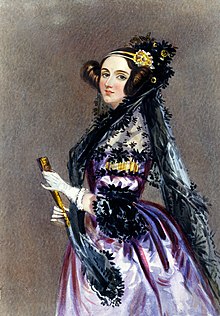 |
| Ada Lovelace, 1815-1852 |
Lovelace was born 10 December 1815 as the only legitimate child of the poet George Gordon, Lord Byron and his wife Anne Isabella Milbanke, Baroness Wentworth. Byron separated from his wife a month after Ada was born and left England forever four months later, eventually dying of disease in the Greek War of Independence when Ada was eight years old. Ada's mother remained bitter towards Lord Byron and promoted Ada's interest in mathematics and logic in an effort to prevent her from developing what she saw as the insanity seen in her father, but Ada remained interested in him despite this (and was, upon her eventual death, buried next to him at her request).
Ada described her approach as "poetical science" and herself as an "Analyst (& Metaphysician)". As a teenager, her mathematical talents led her to an ongoing working relationship and friendship with fellow British mathematician Charles Babbage also known as 'the father of computers', and in particular, Babbage's work on the Analytical Engine. Between 1842 and 1843, she translated an article by Italian military engineer Luigi Menabrea on the engine, which she supplemented with an elaborate set of notes of her own, simply called Notes.
These notes contain what many consider to be the first computer program—that is, an algorithm designed to be carried out by a machine. Lovelace's notes are important in the early history of computers. She also developed a vision of the capability of computers to go beyond mere calculating or number-crunching, while many others, including Babbage himself, focused only on those capabilities. Her mind-set of "poetical science" led her to ask questions about the Analytical Engine (as shown in her notes) examining how individuals and society relate to technology as a collaborative tool.
Further Reading:
Ada Byron, Countess of Lovelace - Science World
Ada Byron, Lady Lovelace (1815-1852) - Yale.edu
Ada Lovelace - Biography
Ada Lovelace - Famous Scientist
Augusta Ada Byron - Encyclopedia.com
Ada Lovelace - Computer History
FindingAda.com

No comments:
Post a Comment
Hi Janeites! Thank you for visiting our website. We invite you to comment on our content. Of course, Lady Catherine would believe us all to behave like gentlemen and ladies, so please let us not disappoint her.
Also, please leave comments in English, as only Lady Catherine, had she ever studied a foreign language, would be a great profient enough to read such comments. (Merci! Arigato! Gracias!)